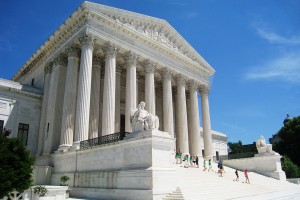US Supreme Court: In a crucial verdict for the LGBT Community, the US Supreme Court has, in a 6-3 verdict, held that
“An employer who intentionally fires an individual homosexual or transgender employee in part because of that individual’s sex violates the law even if the employer is willing to subject all male and female homosexual or transgender employees to the same rule.”
Title VII of the Civil Rights Act, 1964 makes it “unlawful . . . for an employer to fail or refuse to hire or to discharge any individual, or otherwise to discriminate against any individual . . . because of such individual’s race, color, religion, sex, or national origin.”
The batch of cases before the Court, the employers had allegedly fired a long-time employee simply for being homosexual or transgender.
Opinion of the Court
Gorsuch, J., delivered the opinion of the Court, in which Roberts, C. J., and Ginsburg, Breyer, Sotomayor, and Kagan, JJ., joined. He wrote,
“When an employer fires an employee for being homosexual or transgender, it necessarily intentionally discriminates against that individual in part because of sex.”
In the case at hand, the employers did not dispute that they fired their employees for being homosexual or transgender. Rather, they contended that even intentional discrimination against employees based on their homosexual or transgender status is not a basis for Title VII liability. They argued that homosexuality and transgender status are distinct concepts from sex, and that if Congress wanted to address these matters in Title VII, it would have referenced them specifically.
On this the Court said,
“But when Congress chooses not to include any exceptions to a broad rule, this Court applies the broad rule.”
Stating that the limits of the drafters’ imagination supply no reason to ignore the law’s demand, the Court said, Title VII’s prohibition of sex discrimination in employment is a major piece of federal civil rights legislation. It is written in starkly broad terms. It has repeatedly produced unexpected applications, at least in the view of those on the receiving end of them.
“Congress’s key drafting choices—to focus on discrimination against individuals and not merely between groups and to hold employers liable whenever sex is a but-for cause of the plaintiff ’s injuries— virtually guaranteed that unexpected applications would emerge over time. This elephant has never hidden in a mousehole; it has been standing before us all along.”
Judges are not free to overlook plain statutory commands on the strength of nothing more than suppositions about intentions or guesswork about expectations. In Title VII, Congress adopted broad language making it illegal for an employer to rely on an employee’s sex when deciding to fire that employee. The Court, hence, recognised a necessary consequence of that legislative choice:
“An employer who fires an individual merely for being gay or transgender defies the law.”
Dissenting Opinion
Alito, J., filed a dissenting opinion, in which Thomas, J., joined. Kavanaugh, J., filed a dissenting opinion.
Alito, J, in his opinion, wrote:
“There is only one word for what the Court has done today: legislation. The document that the Court releases is in the form of a judicial opinion interpreting a statute, but that is deceptive.”
Title VII of the Civil Rights Act of 1964 prohibits employment discrimination on any of five specified grounds: “race, color, religion, sex, [and] national origin.” Neither “sexual orientation” nor “gender identity” appears on that list.
“Because no such amendment of Title VII has been enacted in accordance with the requirements in the Constitution (passage in both Houses and presentment to the President, Art. I, §7, cl. 2), Title VII’s prohibition of discrimination because of “sex” still means what it has always meant. But the Court is not deterred by these constitutional niceties.”
[BOSTOCK v. CLAYTON COUNTY, GEORGIA, 2020 SCC OnLine US SC 2 , Decided on 15.06.2020]

